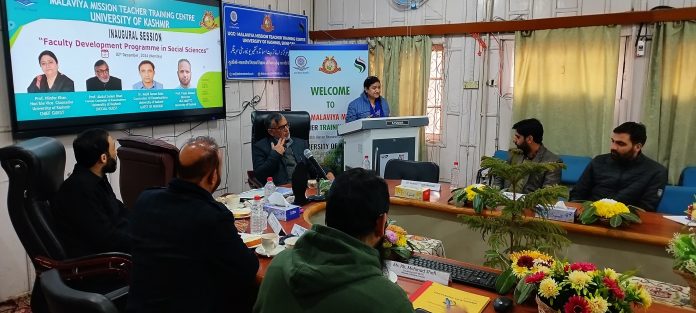KU equips educators with tools to transform regional higher education: VC
SRINAGAR: To enhance the professional, research and pedagogical skills of faculty members from higher education institutions across India, the University of Kashmir (KU), Monday inaugurated a week-long Faculty Development Programme (FDP) in Social Sciences here.
The programme is being organised by the University Grants Commission (UGC)-Malaviya Mission Teacher Training Centre (MMTTC), KU and will run through December 9 in residential/offline mode.
Faculty members and participants from across the country, including Kerala, Assam and various institutions from Jammu and Kashmir are participating in the FDP.
Resource persons from Jawaharlal Nehru University (JNU), Aligarh Muslim University (AMU), Delhi University (DU) and Tata Institute of Social Sciences (TISS) will be interacting with the participants in insightful sessions during the programme.
At the inaugural session, KU Vice Chancellor, Prof Nilofer Khan, reiterated the varsity’s commitment to empower educators through such initiatives and said that “Social Sciences is one of the significant specializations KU offers across its campuses”.
“KU aims to equip educators across disciplines with the tools needed to transform the regional higher education landscape,” she said, adding that KU endeavours to follow a particular roadmap to contribute towards the overall development of the institution while at the same time improving on the deliverables.
KU’s Controller of Examinations, Dr Majid Zaman Baba, termed Social Sciences a ‘diverse subject’ with ideas “that can take a multitude of directions”.
“Great institutions are built by great leaders and the region is lucky to have produced both great leaders and great institutions. KU pioneered the implementation of the National Education Policy (NEP)-2020 and became the first higher education institution in the country to adopt the policy in letter and spirit,” he said.
Highlighting the transformative impact of FDPs on higher education, Former Controller of Examinations, KU, Prof Abdul Salam Bhat, said that integrating innovative teaching strategies and promoting interdisciplinary collaboration can redefine the teaching-learning paradigm.
“We need to update our knowledge and information to stay relevant in today’s fast-changing, technology-driven world and align faculty development with the learner-centric pedagogies while ensuring interdisciplinarity,” he said.
Outlining the objectives of the programme, faculty at KU’s Department of History and Course Coordinator for the current FDP, Dr Younis Rashid, emphasised the role of such activities in equipping participants with advanced teaching methodologies, research skills and academic leadership.
“The FDP aims to enhance teaching, research and professional capabilities of faculty members, encouraging collaboration across disciplines and supporting academic career progression,” he said, adding that the weeklong deliberations would provide a platform for vibrant exchange of ideas and experiences.
Director, UGC-MMTTC, Prof Fayaz Ahmad, highlighted the importance of promoting innovative pedagogical practices and creating a collaborative academic ecosystem.
“When you have a heterogenous group participating in faculty development, activities naturally become vibrant,” he said.
Course Coordinator, UGC-MMTTC, Dr Faheem Syeed Masoodi, conducted the proceedings of the inaugural session, while Course Coordinator, UGC-MMTTC, K M Shafi, proposed the formal vote of thanks.


